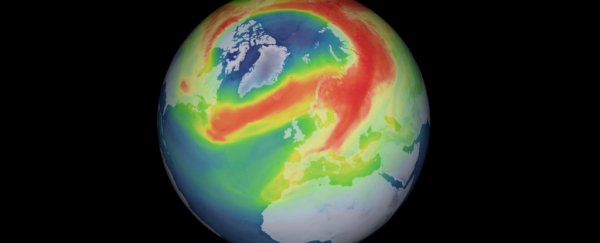Over the last month, a new hole in the ozone layer has started to form over the Arctic.
The ozone layer over the North Pole has been depleted plenty of times in the past. But this time around, extreme weather and atmospheric conditions have led to a far greater depletion than normal, according to a European Space Agency press release.
While the ESA scientists expect it to close up later this month, it's a troubling update on the planet's environmental health.
This year's Arctic ozone hole is bigger than normal because of atypically cold temperatures in the stratosphere that helped trap a whirlpool of icy wind, called a polar vortex, in the area that dispersed ozone more than usual.
Still, even this unusually large hole in the ozone layer is considerably smaller than the more well-known hole over Antarctica, according to the ESA release.
That one can grow to be as much as 25 million square kilometers — though it's been smaller lately — and the new Arctic hole is less than 1 million square kilometers in size.
It remains unclear what to expect in the coming years. While the larger-than-average ozone hole was caused in part by extreme weather, which has been linked to climate change, it's too soon to declare that the Arctic ozone depletion will continue to get worse if climate change continues unchecked.
But we do know that ozone depletion can give rise to extreme weather around the world, meaning increasing ozone depletion could have far-reaching implications down the road.
This article was originally published by Futurism. Read the original article.
